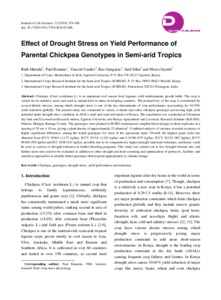Effect of Drought Stress on Yield Performance of Parental Chickpea Genotypes in Semi-arid Tropics
Abstract
Chickpea (Cicer arietinum L.) is an important cool season food legumes with indeterminate growth habit. The crop is valued for its nutritive seeds and used as animal feed in many developing countries. The productivity of the crop is constrained by several abiotic stresses, among which drought stress is one of the key determinants of crop performance aaccounting for 40-50% yield reduction globally. The present study was conducted to screen, evaluate and select chickpea genotypes possessing high yield potential under drought stress condition at ASALs (arid and semi-arid lands) of Kenya. The experiment was conducted at Chemeron dry land and Eco-tourism Research station, Egerton University and Kenya Agricultural and Livestock Research Institute (KALRO), Pekerra, Marigat, Baringo County. The genotypes were planted in RCBD (randomized complete block design) in three replicates at a spacing of 30 cm × 10 cm, giving a plant density of approximately 25 plants/m2. Combined analysis of variance revealed existence of highly significant differences among the tested genotypes for most of the agronomic traits. Overall, the highest grain yield was obtained from ICCV 92944 (1,173 kg/ha), ICCV 92318 (1,103 kg/ha) and CAVIR (975 kg/ha), ICCV 92318 (967 kg/ha), ICCV 00108 (956 kg/ha) and ICC 4958 (921 kg/ha): possibly due to its comparatively higher drought (and heat) tolerance, and hence could be used as sources of drought tolerance in further breeding programs. This study was carried out in few drought tolerant sites and further more sites need to be evaluated in addition to other drought and heat screening and optimization of protocols, facilities and analytical approaches to identify better genotypes that respond appropriately to climate change

